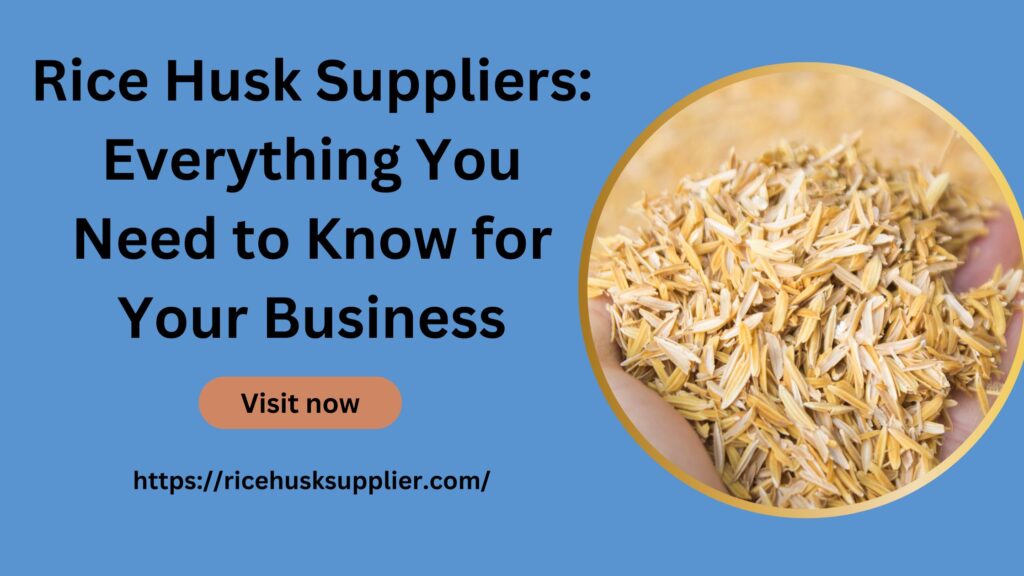
Rice husk is an important by-product of the rice milling industry, and its applications are vast and varied. It is not just waste material but an essential resource for several industries. From being used as fuel in boilers to serving as a key ingredient in the production of organic fertilizers, rice husk is a valuable commodity. In this article, we will explore the role of rice husk suppliers, what to look for in a supplier, the industries that use rice husk, and much more.
What is Rice Husk?
Rice husk, also known as rice hull, is the outer covering of rice grains. It is discarded during the milling process, which removes the rice from the stalk. Traditionally, rice husk has been seen as waste, but in recent years, it has gained recognition for its numerous uses.
Common Uses of Rice Husk:
- Bioenergy: Rice husk is used as an efficient source of energy in the form of rice husk briquettes and pellets.
- Agriculture: It serves as a key ingredient in organic fertilizers and soil conditioners.
- Construction Materials: Rice husk ash is utilized in cement and concrete products.
- Packaging Materials: Rice husk is used to create eco-friendly packaging materials and products.
Key Industries That Use Rice Husk
Rice husk suppliers cater to various industries that use rice husk as raw material for production. Here are some industries that benefit from rice husk:
Power Generation Industry
Rice Husk as Biofuel: Rice husk is often used as a renewable energy source for power generation, particularly in regions where rice farming is prevalent. Rice husk-fired boilers produce steam, which is then used to generate electricity.
- Advantages: It’s a low-cost fuel alternative to coal, and its use helps reduce environmental pollution.
Agriculture and Horticulture
Organic Fertilizers: Rice husk is rich in silica and can improve soil quality. It is often used in combination with other organic materials to create compost or bio-fertilizers.
- Soil Aeration: The husk is used as a soil conditioner to improve drainage and aeration.
Construction Industry
Rice Husk Ash in Cement: Rice husk ash (RHA), which is produced by burning rice husk at high temperatures, is used in the production of eco-friendly cement. It enhances the durability and strength of concrete.
- Green Building Materials: Rice husk is used in eco-friendly and sustainable building materials, reducing the environmental impact of construction.
Packaging and Biomaterials
Eco-friendly Packaging: Rice husk is a biodegradable material used to make sustainable packaging products, including molded products, plates, and trays.
- Plastic Alternatives: It’s also used as a filler in biodegradable plastic, replacing petroleum-based products.
Animal Feed Industry
Animal Feed: Rice husk is used in the production of animal feed. It is mixed with other ingredients to enhance fiber content and improve nutritional value.
Factors to Consider When Choosing Rice Husk Suppliers
When looking for rice husk suppliers, businesses must evaluate certain factors to ensure they are getting the best quality material and service. Here are some of the key factors to consider:
Quality of Rice Husk
- Purity: High-quality rice husk suppliers ensure that their products are free from contamination and impurities.
- Moisture Content: Rice husk should have a low moisture content to ensure it burns efficiently for energy purposes. Suppliers should offer dry husk for optimal use in energy generation.
Supply Capacity and Reliability
- Consistent Supply: It is crucial to choose suppliers who can provide a consistent and reliable supply of rice husk, especially for industries that depend on large quantities, such as power generation or construction.
- Delivery Timeliness: The supplier should be able to meet your delivery deadlines without delay.
Location and Accessibility
- Proximity: The supplier’s location plays a key role in logistics and shipping costs. Suppliers located near rice-producing regions may offer better pricing due to lower transportation costs.
- Shipping Facilities: Ensure that the supplier has well-established logistics to ship the rice husk efficiently to your location.
Pricing and Payment Terms
- Competitive Pricing: Compare pricing among various rice husk suppliers to ensure you are getting the best deal. The price of rice husk varies based on the quality and volume of the material.
- Payment Flexibility: A good supplier should offer flexible payment terms that suit your business needs.
Reputation and Experience
- Established Suppliers: Look for suppliers with a strong reputation in the industry. Established rice husk suppliers have experience in meeting customer demands and adhering to quality standards.
- Customer Reviews: Check customer feedback and testimonials to gauge the reliability and performance of the supplier.
Top Benefits of Buying Rice Husk from Trusted Suppliers
Cost-Effective
- Affordable Prices: By buying rice husk directly from trusted suppliers, businesses can access a more cost-effective material compared to other alternatives like wood or coal.
- Bulk Discounts: Suppliers often offer discounts for bulk purchases, further reducing costs for large-scale users.
Eco-Friendly
- Sustainability: Rice husk is a natural, renewable material. By sourcing it from reliable suppliers, businesses contribute to sustainability and reduce their environmental footprint.
- Waste Reduction: Purchasing rice husk helps in reducing agricultural waste, giving it a second life in various industries.
High Quality
- Consistent Quality: Trusted suppliers focus on maintaining high-quality rice husk, which is essential for many industrial applications. Reliable suppliers provide clean, dry, and pure rice husk that meets industry standards.
Conclusion
Rice husk is a valuable resource with diverse applications across industries like energy, agriculture, construction, and packaging. By choosing a reliable supplier, businesses can benefit from a cost-effective, eco-friendly, and high-quality material. When selecting a rice husk supplier, it’s important to consider factors such as quality, pricing, delivery reliability, and industry reputation.

